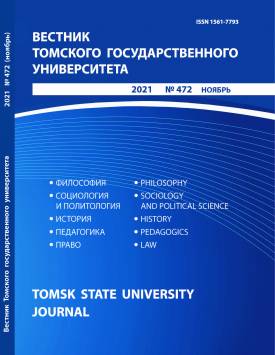News Consumption by Members of Virtual Environmental Protest Communities (On the Example of the Conflict Over a Landfill in Arkhangelsk Oblast)
The growing influence of social media has significantly affected various aspects of sociopolitical life, including social movements and protest activity. Social networks are becoming a part of everyday life, influencing the processes of media consumption. Traditional media are no longer the main source of news, being replaced by social media. Users of social networks largely build their individual agenda setting, forming their own news feed, subscribing to a particular virtual community (media, parties, etc.). Realizing this, the latter are trying to make use of it by creating virtual communities on social networks. Over the past decade, observers have noted that social networks are beginning to play a significant role in public life in Russia. In this regard, the problem of user behavior in various social networks seems to be important for research, including such an important component of everyday life as news consumption. This work analyzes news consumption patterns of members of virtual communities created on the VKontakte social network in connection with one of the most noticeable socio-ecological conflicts of the last decade around the construction of a landfill in Shies. In this study, the author planned to compare members of “anti-garbage” communities and members of territorial communities (Arkhangelsk Oblast and the Komi Republic) in relation to news consumption. He decided to limit the scope to two areas of news consumption by community members: environmental and political agendas. Interest in the environmental agenda could be expressed by joining virtual environmental communities. Similarly, interest in the political agenda could be expressed by joining communities offering political news. In addition, members of “anti-garbage” communities were surveyed in relation to the extent to which they followed the most notable protest events of the past year, not related to the environmental agenda. The study revealed the difference between members of communities created in connection with the Shies landfill project from members of territorial communities in their interest in various federal virtual communities offering political news. The analysis showed that the agenda setting of members of “anti-garbage” communities, in comparison with the agenda setting of members of territorial communities, formed by an individual news feed, is more alternative to the official agenda. Users interested in news in connection with an acute socio-ecological conflict are more interested in news provided by “independent” media and opposition political movements. In this regard, we can speak about the greater politicization of citizens concerned about the acute environmental conflict. The analysis also revealed a connection between the agenda setting formed by virtual communities and the interest of members of “anti-garbage” communities in protest events that go far beyond the environmental agenda.
Keywords
social networks, virtual groups, consumption of news, socio-ecological conflictAuthors
| Name | Organization | |
| Golbraikh Vladimir B. | Sociological Institute, Federal Center of Theoretical and Applied Sociology, Russian Academy of Sciences | vgolbraih@mail.ru |
References

News Consumption by Members of Virtual Environmental Protest Communities (On the Example of the Conflict Over a Landfill in Arkhangelsk Oblast) | Vestnik Tomskogo gosudarstvennogo universiteta – Tomsk State University Journal. 2021. № 472. DOI: 10.17223/15617793/472/7
